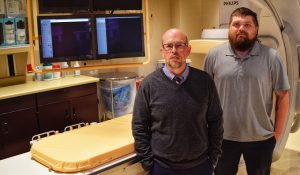(WACO, Texas) – The technical well-being of patients at Navarro Regional Hospital is in Travis Recksiek’s hands.
Recksiek, a biomedical technician, is responsible for about 1,500 pieces of medical equipment at the hospital and four clinics in Corsicana. He usually starts his workday at 6 a.m., almost an hour ahead of when operating room doctors and nurses begin their work. He can be finished with his day by 2:30 p.m. unless there are repair emergencies.
Recksiek grew up in Waxahachie and learned about biomedical equipment technology from his stepmother, who worked at an area hospital. He graduated in 2010 from Texas State Technical College’s Waco campus with an Associate of Applied Science degree in Biomedical Equipment Technology.
Mark Plough, TSTC’s statewide department chair for Biomedical and Medical Imaging Technology, foresees an increasing need for qualified technicians in Corsicana’s health care industry.
“Corsicana is a growing area. And as the hospital expands, so will the opportunities for health care technology management technicians,” Plough said. “Navarro Regional Hospital will have one of our students interning this semester. They have been very supportive of our program.”
Texas had more than 3,500 medical equipment repairers as of 2018, according to the U.S. Bureau of Labor Statistics. Jobs for those technicians are projected to increase nationally to 55,800 by 2028, according to the agency.
But finding enough qualified workers to fill those jobs could be a problem.
“The health care technology management field is losing experienced technicians as the baby boomers retire,” Plough said. “This is a double-sided sword. The aging population will put more burden on the medical facilities, and there will be fewer people to repair, calibrate and perform preventive maintenance. This is a concern for all of the technical fields.”
Recksiek’s supervisor, Chad Sanders, is also a graduate of TSTC’s Biomedical Equipment Technology program. Sanders is the hospital’s director of plant operations and its safety officer. His job includes ensuring the facility abides by guidelines from the Center for Medicare and Medicaid Services and The Joint Commission.
Before Recksiek’s arrival, Sanders was the hospital’s biomedical technician.
“I was ready to move up, but I enjoyed my work as a technician,” Sanders said.
Sanders said biomedical technicians need to have good communication skills, learn hospital protocol, know about privacy concerns, be good at scheduling, and have familiarity with Health Insurance Portability and Accountability Act (HIPAA) guidelines.
“Working in the nonclinical side of health care has its perks,” Sanders said. “We have more time to get the job done.”
Sanders, who grew up in Hillsboro, previously worked in manufacturing before attending TSTC and also did a program internship before pursuing the health care field.
“The internship is vital for any medical equipment repair program,” Plough said. “The internship allows the students to put into practice the knowledge they have gained through their formal education. The real-time experience helps the students connect the dots between theory and reality.”
For more information on Texas State Technical College, go to tstc.edu.
